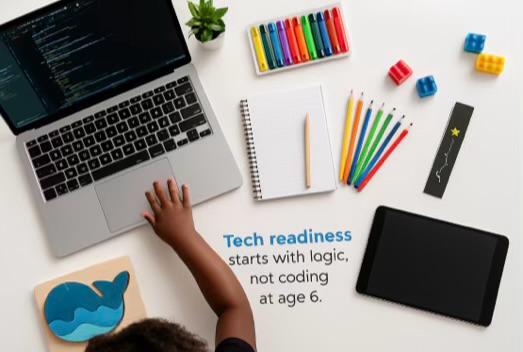
Technology permeates every aspect of our lives, from our daily interactions to our workplaces and classrooms. This causes a sense of urgency in many parents: “Will my child fall behind if they don’t begin coding by the age of six?”
It’s an understandable fear. Our goal is to get our kids ready for the future. However, putting children through coding boot camps before they have even mastered fractions isn’t always the best approach to get them ready. In actuality, timing is crucial, and the how is equally as significant as the when.
The Argument Against “Full” Tech Immersion
While exposing children to technology is important, fully immersing them too early comes with potential downsides that many parents overlook.
Risks to Social Development
The development of social and emotional abilities is most important during childhood. Playing in groups, learning to share, settling disputes, and making friends are just as important as studying. Children may miss out on unstructured playtime that develops these abilities when they are forced to spend long hours in structured tech learning (such as coding classes).
Consider an 8-year-old who would rather debug a game project than go for a run with pals. They might learn how to fix bugs in software, but what about “bugs” in real life, like empathy, cooperation, or dispute resolution? You can’t learn these on a screen.
Burnout Risk
Youngsters are inherently curious, yet they also grow bored easily. What excites them today might bore them tomorrow. Enrolling them into intense tech programs too early runs the risk of making technology seem like a chore, rather than a pleasure.
A youngster who begins formal coding at age six, for example, can feel “done” with it by the time they are thirteen, just as their peers are learning it with fresh enthusiasm. They lose the long-term curiosity and resilience necessary to excel in IT careers later on because of this early burnout.
Neglecting Other Core Areas
Math, logic, reading comprehension, and problem-solving skills are the cornerstones upon which technology is built. A child may find it difficult to use advanced tech tools or code if these aren’t well-developed.
Consider this: would you assign a youngster to write a novel before they had mastered the alphabet? Without strong foundations, early tech immersion is like building a skyscraper on sand.
What to Do Instead
The focus should be on fostering nurturing their innate curiosity and logical reasoning skills rather than pushing them into tech courses or coding camps. This provides a solid foundation for future tech education.
Strengthen Logical Thinking
Logic is the foundation of technology. A child who can identify patterns, solve puzzles, and connect ideas will later find coding simpler and more pleasurable.
This can be developed practically in the following ways:
- Math activities and games: Encourage kids to love numbers rather than be afraid of them. Even routine tasks like shopping can be transformed into addition and subtraction lessons.
- Puzzles and board games: Board games and puzzles: Games like Sudoku, chess, and even LEGO sets help players improve their strategy, logic, and problem-solving skills.
- Science experiments: Cause-and-effect reasoning can be taught at home through easy, hands-on activities.
Without them even realising it, you’re training their minds for technology by bolstering reasoning at a young age.
Provide Tech Tools for Play
Allow them to experiment with technology rather than jumping right into coding. Children learn best through play.
Examples include:
- Educational apps and games: Educational games and apps: These can provide enjoyable instruction in creativity, memory, and problem-solving.
- STEM toys: Children can freely experiment with technology using robotics kits, digital drawing tablets, or even basic programs like Scratch Jr.
- Creative use of devices: Encourage children to use their devices creatively by encouraging them to edit images, construct slideshows, or make quick films. Activities that blend digital abilities and creativity.
This approach enables kids to view technology as a means of creativity and expression rather thanjust another subject they must “study.”
Encourage Curiosity, Not Pressure
Children are natural explorers. You have the opportunity to gently foster learning if kids exhibit curiosity, such as by inquiring about how applications operate or why a video game reacts a specific way.
For instance:
- Introduce them to visual coding tools like Scratch if they inquire about the process of creating a game.
- Assist them in making basic presentations or narrative videos if they are captivated by YouTube.
- Allow children to disassemble an old, safe gadget to examine what’s inside if they have an interest in devices.
Exposure driven by curiosity makes sure they connect technology with awe rather than pressure.
Balance Tech with social and physical aspects of life
A child’s world should be enhanced by technology, not overtaken by it. Lack of balance and excessive gadget use can result in sedentary behaviours, poor communication skills, and less outdoor time.
To balance this, set boundaries:
- Screen time limits: Make sure gadgets don’t take the place of family time or playtime.
- Outdoor activities: Play with friends, sports, and art should all continue to be important aspects of childhood.
- Family projects: Encourage cooperative activities that teach cooperation away from screens, such as cooking or gardening.
Children who achieve this balance grow up to be well-rounded individuals who can succeed both in the digital and physical world.
So, What’s the Appropriate Age?
Although there’s no one-size-fits-all solution, the following guidelines can help:
- Ages 0–6: Focus on play, curiosity, social growth, and the development of logic via storytelling, riddles, and practical play. Technology should be used sparingly, amusingly, and under supervision.
- Ages 7–10: Introduce structured, instructive digital play. Scratch, typing software, and basic STEM toys are ideal tools. Keep it light and fun.
- Ages 11–14: Initiate formal, structured education, such as robotics, design, or beginner coding. At this age, their academic foundations are firmer, and kids are able to strike a balance between curiosity and discipline.
- Ages 15+: If they’re interested, delve deeply into advanced tech skills. You can explore specialised courses internships, or coding boot camps. They are mature enough at this age to decide whether it is a skill or a passion.
Children don’t have to master technology in elementary school. They require the right ratio of reasoning, curiosity, inventiveness, and social interaction. These are the real pillars that set them up for long-term success in both life and tech.
So, instead of worrying about whether your child is “falling behind” in coding classes, concentrate on developing their interest and cognitive strength. The right time to embrace tech fully will come naturally and when it does, they’ll be ready to embrace it for the long haul.
Now over to you; what do you think is the right age for children to be fully introduced to technology? Share your thoughts in the comments section below!




Your point about nurturing logical reasoning before pushing coding is spot on. The analogy of building a skyscraper on sand really sticks with me
Spot on
Spot on my mentor👏👏
This article will help many parents reframe their fears about “falling behind” and instead focus on holistic growth.
I can already imagine referencing this post in parenting groups. It’s a timely, helpful contribution.
I admire how you validate parents’ fears while gently guiding them toward a healthier approach. It’s encouraging, not judgmental.
What a refreshing take. I absolutely love that this post emphasizes the ‘when and how’ of tech exposure instead of rushing kids too early
I appreciate how you balanced optimism about technology with caution about social and emotional development. Very well done.
Your age guidelines (0–6, 7–10, 11–14, 15+) are practical and realistic. They give a clear roadmap without being rigid.
Beautiful write up
I loved the suggestions of puzzles, board games, and STEM toys as ways to build foundational skills. Very actionable advice
This is one of the clearest, most balanced pieces I’ve read on the topic. Kudos for tackling a sensitive subject with nuance